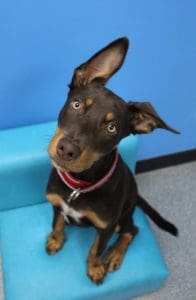Doggy dehydration is an all too common problem in the summer months. Dehydration can make your hairy friend feel lethargic and has the potential to cause severe problems with the kidneys and other internal organs if untreated.
How do you tell if your dog is dehydrated?
The three key steps to assess your pet’s hydration are:
Step 1 Check the tongue and gums: Are the tongue and gums moist or dry? If they are dry, there is a chance your dog may be dehydrated. Is the saliva thick or ropey? Normally, saliva is quite watery and hardly noticeable.
Step 2 Check the eyes: Are they bright and shiny or do they sink into their sockets? Sunken or dry eyes may indicate dehydration and warrant veterinary attention.
Step 3 Do the skin turgor test: To perform this test, take a generous pinch of the skin on your pets back, gently pull upwards to form a tent and release it quickly (note: avoid the neck skin as in some breeds it may be too thick for an accurate test). Watch the skin as it returns to its resting position. In normally hydrated individuals the skin will snap back into position quickly. In dehydrated pets the skin will return slowly or remain slightly tented – this is a sign of possible dehydration.
What you SHOULD DO if you think your pet is dehydrated:
- For moderate or severe dehydration immediately seek assistance from your local veterinarian.
- For mild dehydration in the absence of vomiting, give frequent, small amounts of water; 1 teaspoon per hour for a small dog, 1 tablespoon – ¼ cup for a medium to large dog every 1-2 hours.
- If your pet is sleepy and reluctant to move, in pain or hasn’t eaten for 24 hours go to your regular veterinarian or nearest emergency centre (for after-hours care) for assistance.
- If you are unsure about your pet’s hydration seek help from your local veterinarian.
What you SHOULD NOT DO if you think your pet is dehydrated:
- Do not allow your pet to have free access to large amounts of water or other liquids. Instead give small, frequent volumes as described above.
- Do not feed your pet any dry food unless your veterinary professional has advised you it is safe to do so.
For Further Reading:
cool & kalm